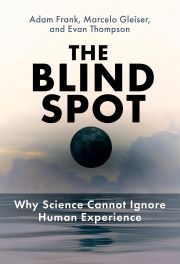The Blind Spot: Why Science Cannot Ignore Human Experience

Adam Frank, Marcelo Gleiser and Evan Thompson
MIT Press, £27.00
Undeniably, this is an important book, advocating a veritable Kuhnian ‘scientific revolution’
in seeking ways to address the existential predicament in which humanity is increasingly enmeshed – from challenges such as climate change, global pandemics, habitat destruction, digital surveillance and threats from artificial intelligence.
The authors, North American philosopher/scientists, with persuasive rhetoric and piercing insights, challenge the pervasive reductionism into which they claim we have been led (their ‘blind spot’) to ignore our crucial role as observers. The dominant agenda is based on the assumption that the universe can be fully described in objective scientific terms without reference to minds – revealing the paradox that while we’re central to the reality we discover, we’re ignorant of our minds’ cognitive processes in acquiring that knowledge.
Biological concerns occupy only three of the 10 chapters, but several others provide relevant insights. Acknowledging the extraordinary progress made in understanding the basis of life by discoveries entailing DNA, RNA and protein synthesis, the authors criticise reductionism, because ‘living organisms produce, repair and generally maintain themselves’ – a kind of systemic organisation dubbed ‘biological autonomy’. The major flaw of the epistemic reductionism that regards organisms as machines, like those we manufacture, is the bifurcation of nature, which demands that life’s most salient features are split off as epiphenomena (e.g. consciousness) of more fundamental molecular processes.
The authors claim that overcoming the dominant ‘scientific imperialism’, a mindset that now infiltrates politics and economics, demands urgent changes in the aims of government policies, scientific research and academic curricula.
Professor Ben Mepham FRSB


